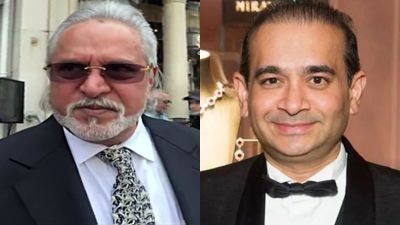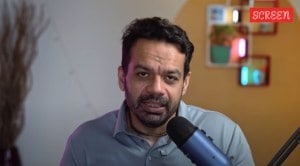Stay updated with the latest - Click here to follow us on Instagram
PM Modi clear on how India can be free of communalism: NITI Aayog vice-chairman
Kumar said competitive federalism, government accountability and a bridge between public and private sectors could ensure that India emerged as a model for the rest of the world.
 NITI Aayog Vice-Chairman Rajiv Kumar addresses students at the Law Auditorium in Panjab University, on Thursday (Express Photo/Jasbir Malhi)
NITI Aayog Vice-Chairman Rajiv Kumar addresses students at the Law Auditorium in Panjab University, on Thursday (Express Photo/Jasbir Malhi)
“We often don’t take credit for all that we have achieved since Independence. India is the only country in the world that chose to undertake the economic, political and social transitions simultaneously,” said Rajiv Kumar, Vice-Chairman, NITI Aayog. The top member of the government’s think tank spoke on the topic, New India@2022, at the 46th Panjab University Colloquium-cum-3rd Shenmar Memorial Oration on Thursday.
Kumar, presenting a vision for India in 2022, talked about the government’s three-fold plan to make development a mass movement in the country. He said competitive federalism, government accountability and a bridge between public and private sectors could ensure that India emerged as a model for the rest of the world.
Kumar highlighted six social indicators that will be in focus to achieve the goal of a New India: an India free of poverty, dirt and squalor, corruption, terrorism, casteism and communalism. “Under poverty-free India, key areas will be nutrition of children, education, infrastructure and connectivity. We will soon launch the school education index under ‘Padhe India, Badhe India’.”
He further stated that the UDAN scheme would connect regional towns and every young child would be able to access the best libraries in the world under BharatNet. “Under dirt and squalor free India, Mahatma Gandhi’s aim of an open defecation free (ODF) India is being realised. Malnutrition in our children is mainly due to a lack of hygiene which is how they get diarrhoea, cholera and jaundice, among other diseases,” said Kumar.
According to the Economic Survey, eight states and two Union Territories have declared themselves ODF so far. He also spoke about introducing the biodigester technology that will “change the face of urban India” because then there will be no use for sewage treatment plants and sewerage in cities and towns.
Regarding corruption-free India, Kumar stressed on demonetisation and GST. “At least 18.8 lakh businesses are under GST now. Besides, 85.5 lakh new taxpayers have filed their returns after demonetisation and direct taxes have grown by 18.7 per cent this year. Going forward, we’ll not be a successful India if we’re corrupt.”
Coming to the last two indicators, Kumar said India was moving towards a casteist-free approach. He recounted the values of Sarva Dharma Sama Bhava, saying, “Caste has become a negligible factor in India. The Prime Minister is clear on how India should be free of communalism.”
Kumar also touched upon how e-governance would bring about complete accountability and higher efficiency. He added, “We must move away from the system of ‘My Baap Sarkar’ to public private personal partnership so that we are more responsible towards each other.”







